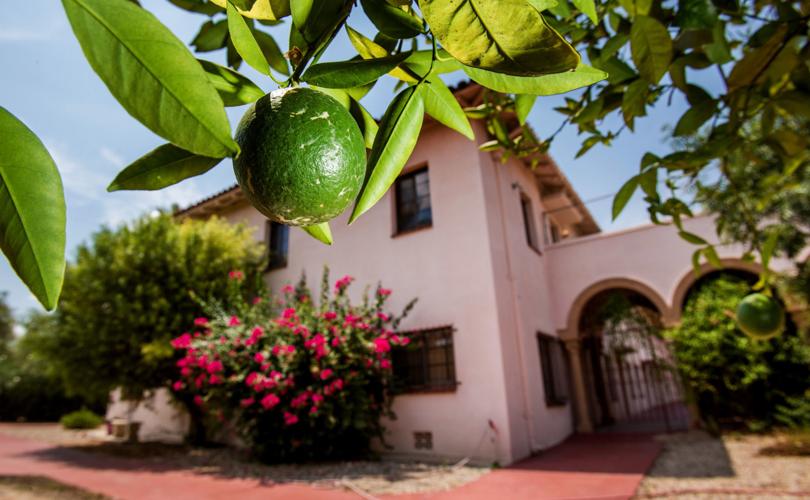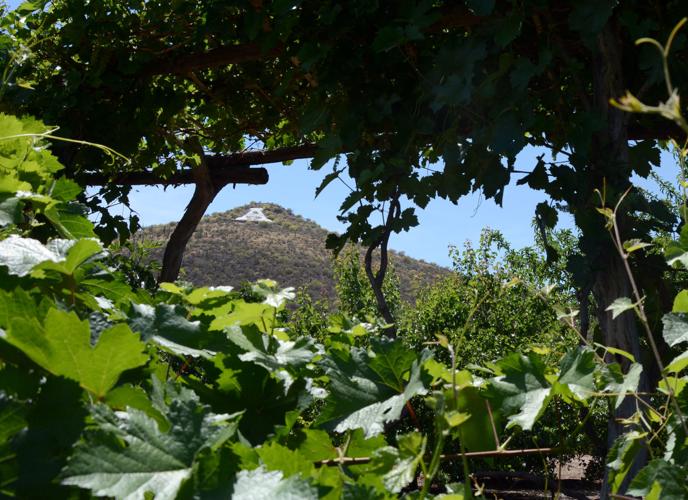Some of the historic trees around Tucson’s Benedictine Monastery will live on despite plans to flip the iconic site into a luxury apartment complex.
A private foundation has stepped up to help with efforts to preserve the story of the Benedictine sisters and their orchard at 800 N. Country Club Road.
The Kaimas Foundation awarded a $10,000 grant to Mission Garden to transplant and graft some of the trees from the monastery’s grounds.
Mission Garden, 946 W. Mission Lane, features heirloom Sonoran Desert-adapted fruit orchards and vegetable gardens interpreting 4,000 years of agriculture in Tucson.
Some of the avocado, peach, pomegranate, date and orange trees will be preserved at the site and others will be transferred to or grafted at the garden on the city’s west side. Grafting involves taking branches of the monastery trees and binding them to tree trunks, known as rootstock, at the gardens to regrow the tree.
“This is a great opportunity to keep the history of these trees alive,” said Jesus Garcia, a board member with Mission Garden.
He said it has been nice to get to know the property owner and developer Ross Rulney and brief him on the significance of the trees.
“He didn’t realize he had a little treasure there,” Garcia said.
Following a tour of the monastery grounds, Ann Charles, executive director of the Kaimas Foundation, brought the situation to the attention of the board, which agreed to help.
“Our motto is small solutions to big problems,” she said. “A lot of people were concerned about preserving the history of those trees.”
The educational component of the project was very appealing to the foundation, Charles said.
“If it ends up being a separate section at Mission Gardens there will be an educational section about the nuns and why they brought these plants here,” she said.
The foundation is a private, family operation and does not accept government funds or solicitations.
The 6-acre site was bought last year by local developer Rulney who plans to build luxury apartments on the grounds around the monastery.
His plans have changed several times as he has worked with city leaders and area neighbors.
The project has been closely followed by community members, some of whom wanted the entire grounds spared from development.
“This has been a very public process with neighbor involvement,” said Ward 6 Councilman Steve Kozachik. “This positive step is another sign that this is all public and above board.”
He said complete preservation was not realistic.
“We’re trying to preserve as much as we can,” Kozachik said. “Ross is all-in on this. There was no arm twisting.”
The significance of the trees was brought to Rulney’s attention from the moment he bought the site and he has kept the water on as he awaits city zoning changes to start construction.
“As I’ve said from the beginning, I’m a Tucsonan and want to develop this property with as much sensitivity as possible,” Rulney said. “Partnering with Mission Garden to preserve the work of the Benedictine sisters is part of that commitment.”
The monastery will be preserved, get a protected historic designation and have a use that includes public access.
Benedictine Sisters of Perpetual Adoration, who occupied the monastery, announced its closure in September 2016 and moved to Missouri earlier this year.
Photos: Benedictine Sisters of Perpetual Adoration, Tucson Monastery
Benedictine Sisters of Perpetual Adoration
Updated
Sister Ramona Varela, Prioress of the Benedictine Monastery, looks to see where workers are fixing the monasteries roof in 2009. The Trento Alpine Society, a thirty member choir from Trento, Italy donated their time to do a concert at the Benedictine Monastery. They helped the Monastery raise funds for the nuns $1 million Preserving Our Heritage campaign for restoration work at the monastery.
Benedictine Sisters of Perpetual Adoration
Updated
Sister Lucia Anne Le stands ready to add in the cheese flavoring to a mixer as she makes a batch of the chedder cheese flavored popcorn at the Prayerfully Popped retail store in Tucson in 2011. The Benedictine Sisters of Perpetual Adoration have endured are trying to raise money to keep their historic monastery operating and make much needed repairs.
Benedictine Sisters of Perpetual Adoration
Updated
Sister Lucia Anne Le mixes around the freshly popped popcorn as it falls out of the popper at the Prayerfully Popped retail store in Tucson in 2011. The Benedictine Sisters of Perpetual Adoration were raising money to keep their historic monastery operating and make much needed repairs.
Benedictine Sisters of Perpetual Adoration
Updated
Sister Stella Cuniff sings during an afternoon mass with Sister Ramona Varela at the Benedictine Monastery in 2007.
Benedictine Sisters of Perpetual Adoration
Updated
Sister Anita Valdez takes the glass of wine from Sister Margaret Mary Bielinski as part of communion during an afternoon mass at the Benedictine Monastery in 2007.
Benedictine Sisters of Perpetual Adoration
Updated
Sister Carmela Rall works on her "Lady of Vladimir" icon painting in 2005 that will take her about a month to complete. She says she makes the eyes the focal point of her paintings since "they are the windows to the soul."
Benedictine Sisters of Perpetual Adoration
Updated
Some of the $40 icons for sale by Sister Carmela Rall in 2005. She says she makes the eyes the focal point of her paintings since "they are the windows to the soul."
Benedictine Sisters of Perpetual Adoration
Updated
A small desk in an alcove in the hallway of the residence area in the Benedictine Monastery in Tucson in 2006, a piece of furniture from the old Steinfeld mansion up for sale by the nuns.
Benedictine Sisters of Perpetual Adoration
Updated
The Benedictine sisters, shown in 2005, spend part of their days at work, another part in prayer. In the computer area, Sister Mary Elizabeth Krone, front, and Sister Anita Valdez work on monastery business.
Benedictine Sisters of Perpetual Adoration
Updated
Sister Barajas moves a 1920s-vintage vanity dresser as she arranges sale items in the monastery's basement in 2006. The starting bid on this piece is $450. All the furnishings in the photo were used at the Downtown mansion where merchant Albert Steinfeld and his family lived in the early part of the 20th century. The money raised will help keep the monastery operating.
Benedictine Sisters of Perpetual Adoration
Updated
Bishop Gerald Kicanas delivers a sermon during a special mass at the Benedictine Sisters of Perpetual Adoration Monastery in 2010. Attendees celebrated the 75th anniversary of the nuns coming to Tucson.
Benedictine Sisters of Perpetual Adoration
Updated
Sister Dolores Dowling chats with Michel de Missy during a reception after Bishop Gerald Kicanas celebrated a special mass at the Benedictine Sisters of Perpetual Adoration Monastery in 2010.
Benedictine Sisters of Perpetual Adoration
Updated
During the reception, Sister Carmela Rall laughs with Angie Lopez after a special mass at the Benedictine Sisters of Perpetual Adoration Monastery in 2010. Attendees celebrated the 75th anniversary of the nuns coming to Tucson.
Benedictine Sisters of Perpetual Adoration
Updated
Andrew Griffith converses with Sister Mary Joy Heinlein while standing next to a table with fresh fruit, cheese and several breads after a special mass at the Benedictine Sisters of Perpetual Adoration Monastery, 800 N. Country Club Rd on November 21, 2010. Attendees celebrated the 75th anniversary of the nuns coming to Tucson at the request of then Bishop Daniel Gercke in 1935.
Benedictine Sisters of Perpetual Adoration
Updated
Sister Pauline, checking the embroidery on a robe she sewed, provides many of the vestment robes for Tucson's Catholic priests with the help of just one other nun in 1998.
Benedictine Sisters of Perpetual Adoration
Updated
Sister Valerie takes to her simple yet comfortable room for Lectio in 1998. At 3 a.m. the nuns go in private to read the bible, meditate on its passages or pray for about an hour.
Benedictine Sisters of Perpetual Adoration
Updated
Sister Carmela laughs with her sisters in the kitchen during the after-dinner dish drying session in 1998. While most of their day is spent working or praying in relative solitude, dish-drying is a chance for all the nuns to be together, socialize, and tell jokes.
Benedictine Sisters of Perpetual Adoration
Updated
Music Director Sister Theresa Marie Tremmel heads up the stairwell to the second floor of the monastery after morning prayer in 1998.
Benedictine Sisters of Perpetual Adoration
Updated
Sister Mary Stella sits in the shade to pray her rosary at Benedictine Monastary in 1998.
Benedictine Sisters of Perpetual Adoration
Updated
A 1963 photo of the Tucson Monastery of Benedictine Sisters of Perpetual Adoration, 800 N. Country Club Road.
Benedictine Sisters of Perpetual Adoration
Updated
Sister Estelle hands out a cup of coffee and an egg sandwich in 1978 at the Tucson Monastery of Benedictine Sisters of Perpetual Adoration, 800 N. Country Club Road.
Benedictine Sisters of Perpetual Adoration
Updated
Sister Marion makes Holy bread in 1986 at the Tucson Monastery of Benedictine Sisters of Perpetual Adoration, 800 N. Country Club Road, Tucson
Benedictine Sisters of Perpetual Adoration
Updated
Sister Marguerite sorts through newspapers in 1986 at the Tucson Monastery of Benedictine Sisters of Perpetual Adoration, 800 N. Country Club Road, Tucson
Benedictine Sisters of Perpetual Adoration
Updated
Sister Elsa maintains candles in 1978 in the sanctuary of the Tucson Monastery of Benedictine Sisters of Perpetual Adoration, 800 N. Country Club Road.
Benedictine Sisters of Perpetual Adoration
Updated
Sister Leona Eichenhofer, 90, prepares hosts for packaging in 1983 at the Tucson Monastery of Benedictine Sisters of Perpetual Adoration, 800 N. Country Club Road.
Benedictine Sisters of Perpetual Adoration
Updated
Sisters during afternoon prayer in 1986 at the Tucson Monastery of Benedictine Sisters of Perpetual Adoration, 800 N. Country Club Road.
Benedictine Sisters of Perpetual Adoration
Updated
A 1958 photo of the sanctuary of the Tucson Monastery of Benedictine Sisters of Perpetual Adoration, 800 N. Country Club Road.





